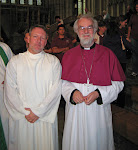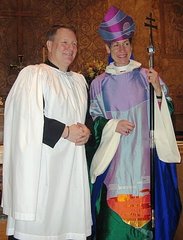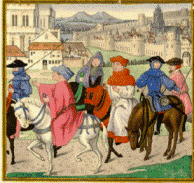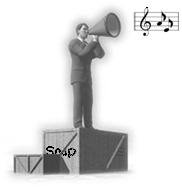 In keeping with long established custom, seniors are invited by the dean to preach a sermon in the Chapel of the Good Shepherd. Mine was on Friday, 21 September 2007, the Feast of St. Matthew. Readings for this sermon can be found here.
In keeping with long established custom, seniors are invited by the dean to preach a sermon in the Chapel of the Good Shepherd. Mine was on Friday, 21 September 2007, the Feast of St. Matthew. Readings for this sermon can be found here.
My mom tells a story about one of her early lessons in parenting, which came from, not surprisingly, another more experienced mother. It came about in a neighbor’s back yard one summer afternoon at a pool party.
Now, when I was a kid, in my neighborhood, the above-ground, backyard pool was a new luxury. Their crimped metal sides and easy-to-puncture blue plastic linings were cumbersome to assemble. And they left a perfect yellow circle of dead Bermuda grass on the lawn when they were disassembled in the fall. But like dutiful wannabe suburbanites, my parents acquired one of these new luxuries, and so did a few other parents in our neighborhood.
Keeping up with the Joneses was impossible though, because just up the street from us was the family of Walter and Pat Jones, and their three kids: Cora, Luke and Sally, and the Joneses had an honest-to-God, concrete sided, aqua bottomed, below ground swimming pool -- with, I might add, that irresistible-to-kids feature: a real diving board which soared above the surface of the water at the dizzying height of about a foot and a half. This was an astonishing amenity in our working class neighborhood, something that could usually only be experienced in the rarified confines of a Holiday Inn.
Our above-ground pool paled in comparison. Thankfully, the Joneses were good neighbors and often invited any and all to cool off in their pool and ‘cannonball’ off their diving board on summer afternoons. One such afternoon found a bunch of neighborhood kids splashing about in the pool and a few moms gathered nearby under a shade tree in green-webbed aluminum lawn chairs with their big glasses of sweet tea and cigarettes…
As was often the case, my brother and I managed to stay in a fairly constant state of conflict throughout the afternoon over whose turn it was to be Marco and whose turn it was to be Polo, or who would go next on the diving board. My mom would call out on occasion or at times get up from her lawn chair to make peace between us. Finally, Pat Jones said to her, “Leave the kids alone. Let them fight it out on their own. You should get to enjoy the afternoon too, you know.” As my mom tells it, that’s when she learned to let my brother and I argue if we were in disagreement, and come to whatever uneasy peace we could manage to negotiate on our own.
And this contentiousness has remained a part of my relationship with my brother to this day. We joke and tease, and argue about politics. He likes to remind me that he has quite a bit more hair than I do, and I like to point out that his waist size now starts with a 4 -- as in size 40 or even 42 inches -- while mine is still in the very high 30s… It makes some people anxious, like my step-mother, who didn’t watch us grow up with our contentious form of affection. But it has become an identifying part of our relationship.
This past Christmas, my father took to calling my brother “The Major” and me “The Reverend”. My brother is in fact a Major in the reserves and is now on active duty with the US Army at a Forward Operational Base outside Gardez, Afghanistan, near the border with Pakistan -- a region long known for its lawlessness, now an area of a great deal of Taliban and Al Qaeda activity.
In terms of my new nickname, I’ve tried to explain to my father that I have not yet undergone the ontological change that will occur when, God willing and the people consenting, I am ordained by a bishop who stands squarely in the historic, Apostolic succession descended from St. Matthew and the other disciples. He is a Baptist after all, and he thinks it’s funny to have two sons with ‘ranks’ that he can tease us about. So, the Major and the Reverend we are…
After this past Christmas, I began to think about this Major and Reverend stuff. Even though The Episcopal Church and the US Army would appear to most people to be fairly distinct, divergent organizations, they have a bit in common. Both are hierarchical, with well defined ‘orders’ within them. Both my brother and I recognize a chain of command as he would say, and are bound to respect a kind of episcopal authority, as I would put it. We both serve in organizations, and ‘serve’ is how we both would characterize it, that are mission driven and that work toward what they believe to be a greater good. We aren’t so different after all. There’s not so much difference between being a Major and a Reverend on a certain level and I think my father, with his teasing, is gently pointing this out to us.
And because my brother and I have freely contended over the justice and efficacy of war, especially the War in Iraq, and over all manner of politics and the US foreign policy, always from opposite ends of the political spectrum -- I know what my brother is about; I know what he believes in his heart. I don’t often agree with him on most things -- and I expect not many of you would either -- but I know clearly what it is that he holds dear, what are his core values and beliefs. And if, God forbid, my brother should become a casualty of the war he is fighting in Afghanistan, I will be consoled by the fact that, for my brother, such a death would have great meaning. For him, it would be a ‘good death’, one in which he was serving his highest values. And I know that because contention and conflict, and the knowledge that it brings us about the other, has always been a part of our relationship. To be a tax-collector in Jesus’s day like Matthew in today’s gospel was to be in conflict with a large part of the Jewish community. Taxes for the largely agrarian first century Palestinian were oppressive and unfair. Jewish citizens already paid religious taxes of about 20% of their income. When Palestine was made a Roman “protectorate,” the taxation system doubled, and the taxes paid by the average family rose to 35 or 40%. Many people paid additional rent for the lands they farmed but did not own outright, bringing the total of rents and taxes up to one-half to two-thirds of the family’s income.
To be a tax-collector in Jesus’s day like Matthew in today’s gospel was to be in conflict with a large part of the Jewish community. Taxes for the largely agrarian first century Palestinian were oppressive and unfair. Jewish citizens already paid religious taxes of about 20% of their income. When Palestine was made a Roman “protectorate,” the taxation system doubled, and the taxes paid by the average family rose to 35 or 40%. Many people paid additional rent for the lands they farmed but did not own outright, bringing the total of rents and taxes up to one-half to two-thirds of the family’s income.
Being a tax collector made Matthew a collaborator with Rome, the pagan oppressors and occupiers -- it made him ritually unclean as well as what many considered a traitor to his own people.
Let’s leave Matthew for a moment and concentrate on another apostle: Simon the Zealot, as he is called by Luke. Now, scholars disagree about what exactly is meant by this nickname: The Zealot. It may well have meant that Simon was a member of the political faction known as the Zealots that arose in Galilee about the year 6. These Zealots were enraged by the plan to increase taxation based upon the census of Quirinius of Syria. You’ve heard about this event in Luke’s account of the birth of Jesus… “And it came to pass in those days, that there went out a decree from Caesar Augustus, that all the world should be taxed.” In response to this tax initiative, the Zealots took up arms but their short-lived rebellion was quickly put down, and they fade into the background for a bit, then appear again in Josephus’s history of the Jewish Wars as the faction responsible for the Jewish Revolt sixty years later which resulted in the destruction of the temple at Jerusalem by Rome.
So imagine for a moment if you will Matthew the tax-collector and Simon the tax resister, the tax rebel. Would you invite these two fellows to your intimate little dinner party for 12? Would you sit them next to each other at your Last Supper???
It seems as if in calling Matthew the Tax Collector and Simon the Tax Rebel to become his apostles, Jesus is ensuring conflict, inviting discord into his inner circle. This is no way to put together a management team. How is this group going to coalesce, how are they going to manage to follow Jesus without tearing each other apart? How is this ill-matched assemblage, that includes the Tax Collector and the Tax Rebel, going to get along at all? This little grouping might be the Lord’s doing, but I doubt if they all saw it as marvelous. In his book, “Conflict and a Christian Life” Sam Portaro writes, “Conflict can actually be a force for good… Conflict is not just a problem to be resolved…”(1) Portaro points out that “the gospel of Matthew is set in the midst of controversy… and that at many points in Matthew’s gospel the teaching of Jesus is deliberately set against the prevailing practice of the time. When Jesus invites Matthew into his circle and immediately accompanies (him) to dinner with (his) tax collector friends and colleagues” (30) conflict and controversy ensues. Portaro writes, “Matthew was one of twelve very different disciples. At the very least, the call of Matthew and the other eleven reminds us that Jesus obviously tolerated, even embraced” (31) the controversy and conflict that real diversity often brings.
In his book, “Conflict and a Christian Life” Sam Portaro writes, “Conflict can actually be a force for good… Conflict is not just a problem to be resolved…”(1) Portaro points out that “the gospel of Matthew is set in the midst of controversy… and that at many points in Matthew’s gospel the teaching of Jesus is deliberately set against the prevailing practice of the time. When Jesus invites Matthew into his circle and immediately accompanies (him) to dinner with (his) tax collector friends and colleagues” (30) conflict and controversy ensues. Portaro writes, “Matthew was one of twelve very different disciples. At the very least, the call of Matthew and the other eleven reminds us that Jesus obviously tolerated, even embraced” (31) the controversy and conflict that real diversity often brings.
So, here we are, then with a collection of people from the same faith group but with some very different theologies of how best to live out that faith in their context. Each is trying to follow Jesus, to understand what Jesus is teaching, and how that teaching is meant to be applied to the world they find themselves in. There are real differences of interpretation of the scripture and traditions they have inherited; and real questions about just where Jesus and the Spirit are leading them.
Sounds like quite a contentious group, doesn’t it? Sounds like an early version of the Anglican Communion, doesn’t it? Wouldn’t it be funny if, finally, after more than 450 years of Anglicanism, now, as we are at one of our most conflicted places, we are finally getting it right, if we are now truly living out the Apostolic faith -- not by making nice, but by engaging in conflict that is very real, often heart-rending, AND illuminating???
Bishop Gene Robinson was recently among us at the Tutu Center conference on reconciliation. He recounted how at a meeting of Anglicans from around the world, someone said to him, “For us, Bishop, there is not that much difference between George Bush and Gene Robinson.” Bp. Robinson said, “That may be the worst things anyone has ever said about me.” And I’ll bet George Bush might say the same thing. But from some points of view, Bush’s foreign policy and its consequences seem just as unilateral and ill-considered as does Bp. Robinson’s consecration. I don’t like hearing that, and I don’t agree, and maybe you don’t either. But hearing that, and knowing that, I am a little closer to understanding those who so vehemently disagree with our church’s actions regarding human sexuality. Out of dispute, as the conflict has come to fruition, I have learned something about how the rest of our communion sees us. From that point of view the Episcopal Church and US foreign policy aren’t that different. They see a similarity between the president of the United States and the bishop of New Hampshire; just like my dad sees some similarities in my brother the Major and me, the someday Reverend.
Sam Portaro writes, “The trouble with Jesus was -- and is -- that he stands in the midst of conflict, (and) allows that conflict” to occur. “The trouble with Jesus was -- and is -- that he invites us to follow where he has led.” (53).
Conflict is upsetting, frightening, and illuminating. Knowledge comes from telling our truths without self-censorship -- and from listening to the sometimes contradictory truths of others. I have no doubt that it was part of the everyday life of the apostles, as the Acts of the Apostles so often recounts. But out of that conflict, there was forged a faith that has come down to us today, a faith that we pledge to continue in our baptismal covenant when we are asked, “Will you continue in the apostles’ teaching and fellowship, in the breaking of bread, and in the prayers?” and we reply “I will, with God’s help.”
So, continue we must, and by continuing as a Communion in conflict, we might forge a new way of being in communion that truly reflects the apostolic faith that was forged out of a similar atmosphere of conflict.
One quick caveat: I’m talking about being in communion, not covenant. In Matthew’s day there was a covenant design team that was headed up by this guy, what was his name? Oh, yeah, Jesus Christ. And it took him just one draft to establish -- in his blood, no less -- something he called the New Covenant. As far as I’m concerned, that’s just about enough covenant for me.
I want to leave you with an image. I recently visited an exhibition of the work of the sculptor Richard 
As the Anglican Communion and as Christians, this should be our goal. To find a balance through tension and conflict, to continue in the sometimes contentious fellowship of the apostles -- not to allow our different theologies to obscure the fact that we are made of the same material -- we are one body, we are sisters and brothers, and we are called, like Matthew, into communion with those who may see things quite differently than we do. There’s no denying that this communion will encounter conflict from time to time. And there is no denying that it is the Lord’s doing, and it is marvelous in our eyes. ~~ Amen.
05 October 2007
The Feast of St. Matthew
Subscribe to:
Post Comments (Atom)







No comments:
Post a Comment